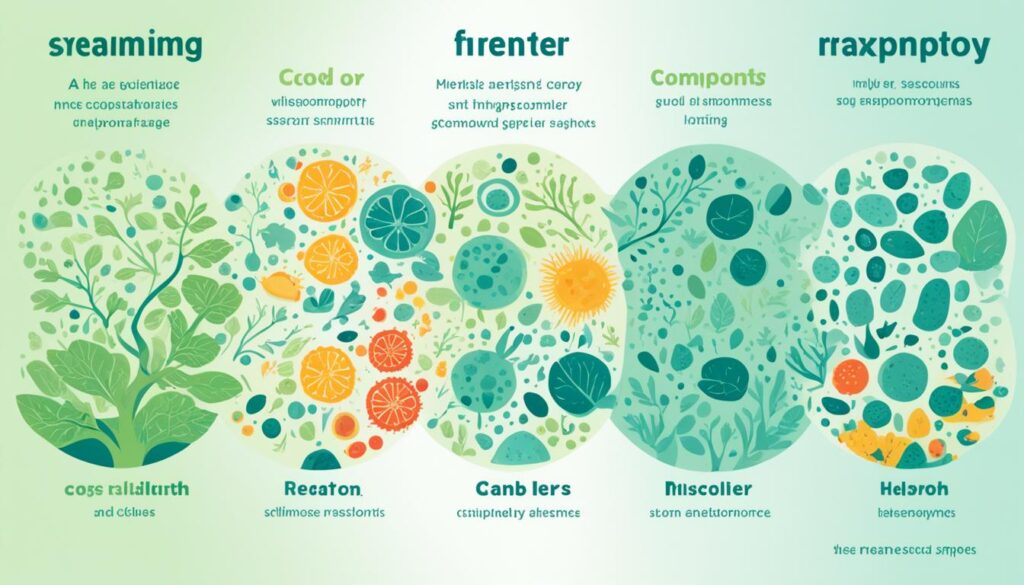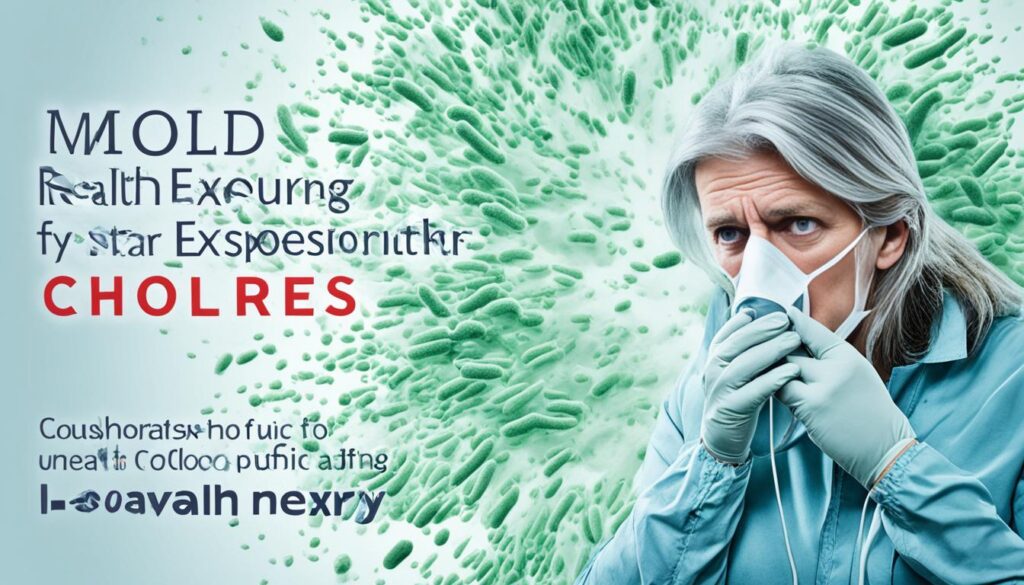
Mold Sickness Symptoms and Health Risks
In this section, we will explore the various symptoms associated with mold sickness and discuss the potential health risks that can arise from mold exposure in your environment.
Mold exposure can have detrimental effects on your health. It is important to be aware of the symptoms that may indicate mold sickness and understand the potential risks involved.
Key Takeaways:
- Mold sickness symptoms can manifest as physical and respiratory issues such as coughing, sneezing, and wheezing.
- Exposure to mold can lead to more severe health conditions like asthma, allergies, and respiratory infections.
- Identifying and addressing mold growth in your environment is crucial for maintaining a healthy living space.
- Seeking professional assistance for mold assessment, prevention, and remediation is advisable if you suspect mold exposure in your home or workplace.
- Contact Fix Mold Miami at 305-465-6653 for the highest-rated mold-related services in Florida.
Common Mold Sickness Symptoms
Exposure to mold can lead to a variety of symptoms in individuals, which can vary depending on the person’s sensitivity and the type of mold present. In this section, we will explore the common mold sickness symptoms that individuals may experience. It is essential to recognize these symptoms early on to take appropriate measures and seek professional help for mold assessment and remediation.
Physical Symptoms:
- Coughing
- Sneezing
- Watery or itchy eyes
- Runny nose
- Sore throat
- Fatigue
- Headaches
Respiratory Symptoms:
- Difficulty breathing
- Wheezing
- Chest tightness
These symptoms are often exacerbated in individuals with pre-existing respiratory conditions, such as asthma or chronic obstructive pulmonary disease (COPD). If you experience any of these symptoms, it is important not to ignore them, especially if they persist or worsen over time.
“Persistent symptoms can indicate ongoing exposure to mold and may require professional intervention to address the underlying issue.”
Skin Irritation:
Exposure to mold can also cause skin-related symptoms, such as:
- Rashes
- Itching
- Redness
These symptoms may occur on areas of the body that have come into direct contact with mold or mold-infested materials. It is important to note that mold-related skin irritation can sometimes be misdiagnosed as other conditions, so it is crucial to consider the possibility of mold exposure when experiencing skin-related symptoms.

Recognizing and addressing common mold sickness symptoms is essential to protect your health and well-being. In the next section, we will explore the potential health risks associated with prolonged mold exposure and the importance of addressing mold growth in your environment.
Health Risks of Mold Exposure
Prolonged exposure to mold can have severe implications for your health. The presence of mold in your environment can lead to various health risks, affecting multiple systems in your body. Here, we will explore these potential health risks and their impact on your well-being.
Respiratory Health
One of the primary health risks associated with mold exposure is its detrimental effect on the respiratory system. Inhalation of mold spores can cause respiratory symptoms such as coughing, wheezing, shortness of breath, and chest tightness. These symptoms can be particularly concerning for individuals with pre-existing conditions such as asthma or allergies. Prolonged exposure to mold may worsen these conditions or even trigger asthma attacks.
Immune System Impairment
Mold exposure can also weaken the immune system, making individuals more susceptible to infections and illnesses. The immune system plays a crucial role in defending the body against harmful pathogens and maintaining overall health. However, exposure to mold can compromise the immune system’s ability to function effectively, leading to an increased risk of respiratory infections and other illnesses.
Allergic Reactions
For individuals with allergies, mold exposure can trigger allergic reactions. Mold spores can act as allergens, provoking symptoms such as sneezing, nasal congestion, itchy or watery eyes, and skin irritation. These allergic reactions can be particularly troublesome for individuals with a history of allergic rhinitis or other respiratory allergies.
Asthma Development
Long-term mold exposure has been linked to the development of asthma, a chronic respiratory condition characterized by inflammation and narrowing of the airways. Individuals exposed to mold for extended periods may experience recurrent asthma symptoms, such as wheezing, coughing, chest tightness, and breathlessness. It is crucial to address mold issues promptly to reduce the risk of asthma development.
It is important to note that the severity of health risks associated with mold exposure can vary depending on factors such as the type of mold, concentration in the environment, duration of exposure, and individual susceptibility. If you suspect mold growth in your home or workplace and experience any of the symptoms mentioned, it is advisable to consult a healthcare professional and seek assistance for proper mold assessment and remediation.

Conclusion
In conclusion, being aware of the symptoms related to mold sickness is crucial for identifying potential mold-related health issues. Mold can cause a range of physical and respiratory symptoms, such as coughing, sneezing, wheezing, and skin irritation. Prolonged exposure to mold can also lead to more severe health risks, including asthma, allergies, and respiratory infections.
If you suspect mold growth in your environment, it is essential to seek professional assistance. Professionals can conduct a thorough mold assessment to identify the extent of the problem and recommend appropriate prevention and remediation measures. By addressing mold issues promptly, you can minimize the health risks and maintain a safe living environment for you and your family.
For the highest-rated services in Florida, we recommend contacting Fix Mold Miami at 305-465-6653 to schedule a mold assessment. They have the expertise and experience to handle mold-related issues efficiently and effectively, ensuring the health and well-being of your home or business.




